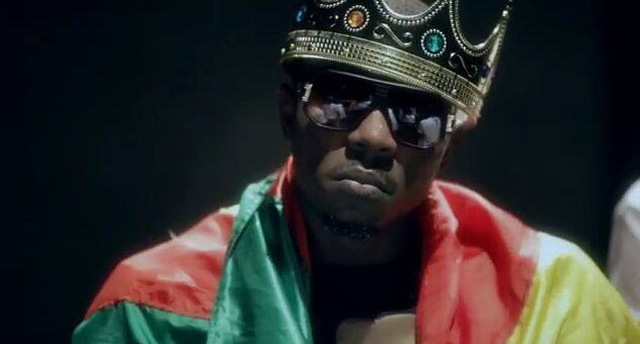| Stanley Enow, JOVI in-roads: A Look from the other side of the Mungo |
| News / Latest / Wednesday, 15 October 2014 12:01 | ||
This piece of writing may be subjective. It is deliberate, but not intended to differ with objectivity in any way. Two reasons explain this subjectivity. One – its writer is neither a musician nor a musicologist. Also, he doesn’t possess a mastery of the nitty-gritty of the rap genre, but like any other lay consumer, can pick out the sense from lyrics, if they are clear enough to be easily grasped. This reason automatically disqualifies this commentary from delving into which of the two ‘raps’ (Stanley Enow’s or Jovi’s) is professionally meaningful than the other. Two – its writer, though a soft critic of various forms of art, is more affectionate with reporting and religiously attached with prominence, a news value that is so strong to resist. It is thanks to this age-old news value that this write-up is motivated, else, they won’t be any point commenting on two singers who have just been doing what they know best. Stanley, just like Jovi make news and if we go by this alone, then a reporter’s role is imminent. The reporter in this write-up therefore, will dominate the critic in it, hence its subjective nature. Forgive it! A vivid understanding of the current phenomenal debate that is pitting fans/critics of Stanley Enow and those of JOVI requires a sound knowledge of the cultural background of both urban artists and the mindset of their kindred. Stanley and Jovi hail from Cameroon, west of the Mungo that makes up just 20% of the total population of the country, if we have to go by regional representation. People from this part of the country are referred to as English-speaking Cameroonians (‘Anglophones’ may sound offensive to many, so it is avoided in several instances). NB: Nothing to do with divisiveness! Until very recently, English-speaking Cameroonian parents (most of whom were educated under strict British school system – the “Standard” days) believed strongly in formal education. Their children had to attend regular schools (from elementary through secondary and high school to the university), study hard, obtain all the certificates that came along with every stage and get white-collar employment. This was non-negotiable. A child who successfully went through this avenue was a pride, not just to the family, but to their community. An English-speaking Cameroonian boy who was gifted in football and would score all the goals for his school team was a liability to his family if he could not make “A” grades in Biology, Chemistry, Mathematics, etc. A girl whose soul-searching voice and skillful dance styles would hold her audience spellbound, yet would not pass her exams did not inspire her community. He, just like she could be the finest performing artists in the college’s drama club, moving from town to town to display their prowess, but if they could not make it in the GCE exams, they had only wasted school fees their parents worked hard enough to pay. Formal education had its place – talents was secondary, if at all it even considered! Children were therefore, not given the chance to explore their talents, let alone becoming stars/celebrities. The few who became public figures via sports and/or music, for instance, were not warmly accepted. To some parents, they were a disappointment. To others, they were simply lost. Even if music or football put food on the family table, it was not as palatable as the food brought in through a white-collar job. Fact! It is so obvious that this unfriendly environment towards creative art brutally suppressed gifted boys and girls to a terrific extent and this atmosphere was sustained for so long. Its adverse effect was bitterly felt within national circles. Little doubt that fewer or no English-speaking boys and girls featured in national projects or were noticed at the forefront of successful initiatives. Sad! For some reason(s), the old order has been fading and seemingly doing so at a faster pace. English-speaking Cameroonian parents and the community at large have been going through an exciting mentality reformation that is noticeable. Presumably, the massive immigration of sons and daughters of this part of the country, the irresistible financial benefits football now offers and the growth of a neighbouring film industry – Nollywood, just to name these, are coaxing indications that the current hike in unemployment (under which graduates lament bitterly) can be utterly dealt with. Parents have now relaxed and would even encourage their children to explore their talents. Behold, within the last couple of years, scores of English-speaking Cameroonian boys and girls have not just emerged, but have boldly risen to the top. Let’s block the last nine (9) years for instance. 2005: Abgor Gilbert Ebot emerges with a stunning movie and has since then been one of Cameroon’s leading film producers. 2006: The first edition of STARS 2 DEMAIN song contest is organized – Achalle emerges winner. The rest is history. 2006: Florence Iyok (interviewed by this writer for Among Youths magazine that same year) becomes Miss Cameroon. 2007: Buea-based BAAM band wins NESCAFE song contest and later features prominently on TRACE TV. 2008: Sidney (now Sine) brilliantly picks up first spot at the highly-competitive AFRICAN STARS (hosted by RFI’s Claudy Siar) song contest. 2009/2010: The Bright Phase band gets to the semis of the All African Music Awards – KORA and performs at the Ouagadougou presidential suite in front of Blaise Compaore in Burkina Faso. 2009: Zinnia’s (still waxing on strong in South Africa) exciting performance fetches her a Mittzig song competition victory and a brand new luxurious car as reward. Examples abound. The records may not be very straights, but to venture that Stanley Enow and Jovi have been the most celebrated urban-styled music artists after the era of Krotal, Koppo, Valsero and to an extent Tony Nobody may not be too far from the truth. In fact, the stir (positive) both rappers have produced has been undoubtedly significant. That the current urban music scene should have two young English-speaking artists at the forefront is amazing to many who hail from this part of the country, but could still be surprising to scores of others. In fact many are Cameroonians who are still taken aback. To a typical news reporter, it is news if what was not so common in the past has become reality, reason we mentioned that this write-up could sound subjective. Facts however are facts. In a previous TIPTOPSTARS write-up, this writer had mentioned the amazing creativity displayed by both rappers and would still stay on that anytime. The term creativity is as big as creativity itself is vast. Take a close, yet critical look at the imposing Rond Point Deido – Douala (popular roundabout in Cameroon’s economic capital) statue. It makes sense, doesn’t it? What is it made of? A combination of just anything (plastic items, bottle corks, etc) picked from here and there, stock together, intertwined to produce what has been described as one of Cameroon’s most brilliant piece of art, at least within the last couple of years. How would an English-speaking Cameroonian of the “Tumbuboss calabar” and “Njama njama cow” (indigenous games common among kids in Cameroon, west of the Mungo in the 70s and 80s) generation, now living in Helsinki – Finland, for instance, feel when Stanley reminds them of those milk and honey days? Your guess is not different from this writer’s. Just the idea of regurgitating this childhood values is brilliant – fact! A typical Bamileke culture custodian would definitely see reason to want to savour Hein Pere and applaud its author – fact!
A former Douala resident now living in Berlin, Germany, for instance would not resist nostalgia when they watch Jovi dramatizing the urban transportation ordeal on the Bonaberi – Rond Point stretch in Douala and how a typical day in the city looks like for a lay dweller. Or, how would a Beti custodian resist the Ewondo lines brilliantly fixed in his latest track, Cash? Both artists speak to their audience in one way or the other and do so brilliantly. Content critique from music specialists or art reporters and comments (some of which could easily be driven by emotions) are always expected since there must be feedback in every communication. If the current debate/argument around Stanley and Jovi are meant to be educative, constructive art-improvement oriented, then it is healthily necessary. Other than this, it may not be so helpful for a talented duo whose route to mega stardom (their background has not enjoyed for so long) has been tedious to traverse. That Stanley and Jovi got to this apex of their game is NEWS! That these English-speaking Cameroonian artists should become the focal point for critics’ as well as citizen debate is NEWS! That they are being celebrated is NEWS! Stanley is talented, Jovi is talented. Like strikers Samuel Eto’o and Didier Drogba have done to the continent, the rappers’ contribution to the country’s/continent’s development in the music sector is worthy of applause. This is the reporter/art promo writer writing! Editor’s Note: Ernest Kanjo is a Cameroonian art journalist and entertainment reporter with years of experience. He is a pioneering member of the African Arts Journalists Network (AAJN) which he and a dozen others (from other African countries) created in 2010 on the sidelines of the Harare International Festival of Arts (HIFA). He is also a radio host (African Cocktail on Afrikka Radio – www.afrikkaradio.com) |

LATEST COMMENTS
 Well, I think the CEA was a very shallow and misgu... More...
Well, I think the CEA was a very shallow and misgu... More... This is creativity we are talking about, this are ... More...
This is creativity we are talking about, this are ... More... Lovelyn,your pre-selection criterias are ok but i'... More...
Lovelyn,your pre-selection criterias are ok but i'... More... camhood 4 the better More...
camhood 4 the better More... fame is gd More...
fame is gd More... CONGRATULATION. THANK GOD FOR YOU GUYS. CAMEROON S... More...
CONGRATULATION. THANK GOD FOR YOU GUYS. CAMEROON S... More... cool girls dat was great but this year we the cons... More...
cool girls dat was great but this year we the cons... More...


